
The amount of entertainment and media that I wallow through is sometimes a little intimidating. It's even more intimidating to think that I often would like to write something about each movie I watch, book or comic I read, or game I play. I think to do so would be noble and just, and bring the Zenspace to the forefront of coverage for such a small blog, but in terms of the actual amount of time I have, it's just damned impossible. So instead, I think I'll start tearing out a series of posts called 100 Word Reviews. In 100 words or less, I'll give the best impressions of something I possibly can, and I'll even try to keep the prose interesting and more creative than regular review-type fair. We'll see how that goes anyways, my creative writing is, at best, average. Why talk forever about something that's meant to be done in 100 words then? Let's just get started:
Movie: The 36th Chamber of Shaolin (AKA Shaolin Master Killer)
Year: 1978, DVD: 2007
Genre: Kung-Fu, Chop Socky, The Best Things Ever Created
Available: Amazon
Imagine a version of Rocky that stopped at the end of the training montage, and then started again at the beginning, this loop repeating forever. Infinitely pumping that energetic Frank Stallone montage jam until your cock was erect and you were tearing out one-hand push-ups with fluid ease and primal motivation. The 36th Chamber of Shaolin is the never-ending training montage, only sans the motivational theme song. Doubly important is the truthful realization of every American boy’s wet dream; a man enters a Shaolin temple with the goal of telling Buddhism to fuck off; he only wants to kick ass.
Music: Icky Thump by The White Stripes
Year: 2007
Genre: Rock, Whatever, Awkward Brother/Sister/Ex-Wife Relations
Available: Amazon
With undeniable surprise, The White Stripes offer classic rock a rebirth. Everything old is new again in Jack and Meg’s, but let’s be honest here, mostly Jack’s, auditory jumble-fuck of guitar squealing mayhem. Homage is an apt term for Icky Thump, but to whom or what is a mystery. It all sounds so familiar, but the presence of Jack White’s catalog of instruments makes for a unique listen. I don’t know what these sounds are coming from, but I’d wager things like harpsichords, glockenspiels, and electric kazoos aren’t far off. Who really cares? It rocks like something we’d long forgotten.
Manga: Brave Story Volume 1
Year: 2007
Genre: Action/Fantasy, Blatantly Average
Available: Amazon
A boy who’s terrible at everything but videogames finds himself chosen as a Traveler, those who navigate between two worlds. It’s as if they didn’t know this would play to the heartstrings of thousands of lonely bastards locked in their bedrooms without the benefit of depression solving sexual relations. Notably, the subsequent release of an actual game and an anime feature makes for a marketing triumvirate of Brave Story, just enough to be physically smothered in a story that’s not too appealing and characters that aren’t too deep. Minus, of course, that one kid who’s father killed his entire family.
There are some people you just don't ever expect to run into. XBLA, he's one of those people. The sneaky bastard will pop up at the most inopportune moments, and without thinking, you'll be forced into making snap judgments about him based on the way he acts. I've done this before, and I realize now that I might have been too harsh on an addict. We've all seen down times, and this poor bastard was just suffering from a dip in the sine curve that is life. So, when I saw him the next time, I was, well, entirely unready for the following. This is the transcribed conversation that XBLA and I had when he suddenly appeared at my workplace, the Barnes and Noble Cafe.
ME: Hi! How can I help yo... Oh, it's you.
XBLA: Hello sir! I remember you, I think, Burger King right?
ME: Um, yeah ... You know, if you cut back on the partying, you might remember things better.
XBLA: Hardly. I haven't partied in months. I've been living the high life without living the high life, you see? I'm on top bitch!
ME: Can't remove the trailer from the park apparently.
XBLA: Whatever that means. Anyways, I see you whoring yourself out to those achievement points. 145 for Double Dragon? You know that was a shit game, right?
ME: .... Yeah, I know. ... I couldn't help it.
XBLA: You're hooked! Then I STILL got you on Lumines. You're buying that new content, aren't you?
ME: Unfortunately.
XBLA: You sorry fucks and your skins. It's like, more of a fucking ripoff than Guitar Hero 2 songs.
ME: Dude! You obviously know what's still wrong, why don't you fix it?
XBLA: Why? Why should I care? You're still buying shit. You just bought Prince of Persia, and you're probably gonna buy Pac-Man, and Band of Bugs too.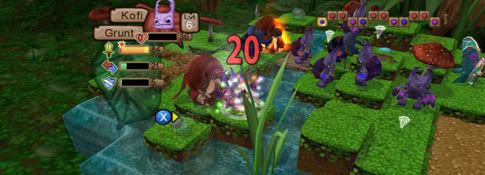
I realized at this moment that I was at work, and I could end this here to go and ... well, work; but here he is, this smug bastard, and that last sentence made me taste a little throw-up. He's right. He's 100% fucking right. Do you know what it's like to sit and speak with the guy who's raping you with the force of a silverback gorilla? The restraint it takes just to not leap the counter and lose my source of employment is more than I can describe. Then again, half the money's going to his stupid fucking themes and picture packs anyways.
ME: Man, I've got to get back to work.
XBLA: Can't handle being near the man, huh?
ME: ... Yeah, something like that.
XBLA: Hey, did you see the critical reception for Pac-Man, they fucking ate that shit up. I knew they would; give 'em shit and they'll complain all day, give 'em shit with sparkles and they'll make you King.
ME: Let's not forget about the King. I saw Burgercon on there, McDonald's giving out Austin Powers for free and all, he's bound to get a little jealous.
XBLA: Oh My God. He called me the second it went live. Crying like a little bitch. What a fucking douche; he can't even take a little healthy competition.
ME: I can see where this is going.
XBLA: Damn right you can! I've gone and fucked the competition right in the ass. Sony can't get a single thing right, except for Calling all Cars, and I hear that's not even that amazing. Do I even need to bring up Virtual Console? They want $5 for NES games. It's like getting fucked by Reggie himself, and I hear he's huge...
ME: Oh God ... the imagery ... please, stop.
XBLA: HaHaHa. So, are you ready for what's coming up?
The conversation's a little more casual at this point. He's raping me; he knows it; I know it, and it sucks. The prices are too high, the content is sometimes shady, and, well, he's still an asshole. He's a giant asshole actually, but I'm getting used to it. Kind of like that one friend who never picks up the bill, XBLA's been fucking me for a while, and in the least homo-erotic way I can possibly say it, I'm pretty used to it. I can't say I enjoy the feeling, but I'm like cellmates with this guy, so it's an unfortunate necessity. The part that I know is coming next is the most interesting though, the part where he makes clear that our dark relationship is undoubtedly going to continue, whether I'd like it or not. The most important bit, though, is that I have one hell of a line of customers that he doesn't seem to care about.
ME: Dude, I've really got to get these guys soon. That old lady is looking mighty pissed.
XBLA: Fuck her, she doesn't Game, man. She's nothing. She'll fucking croak soon anyways. Just wait 5 minutes and she won't even be standing to worry about getting her drink.
ME: Good God, dude, that's one of the worst things I've ever heard.
XBLA: Well, get ready for one of the best. You're not, are you? Not only have I been flooding you with stellar shit up to this point, but it's only going to get better and you know that.
ME: Like?
XBLA: Like fucking Street Fighter, in HD my cheeky friend! Undertow, whatever the hell it's about ... I don't even know myself! Bomberman Live is this summer and I fucking know you're buying that; knowing you, you'd buy two just to keep them making more. Carcassone is going to be sooner than you think, and, well, the list is giant my friend. I'm the fucking Godfather of content these days, actually, fuck that, I'm like Odin the Allfather. I've got movies out the ass, and anime too. You can't resist that shit. Fuck, Puzzle Quest, I know how bad you want to play that, and you even passed on it because you wanted it with achievements right? You're. My. Bitch.
ME: Alright, point made. Can I get the old lady now? She's looking woozy.
XBLA: I guess. I'll see you every Wednesday. These days, I might see you twice each Wendesday; I'm that good.
ME: Fuck.
XBLA: Eh?
ME: She just hit the floor. I better call someone.
XBLA is laughing as he walks away, and I'm calling 911 for Grandma Death that just dropped to the floor. Whether she passed out from exhaustion or she dropped to the floor asking Jesus forgiveness from hearing the language XBLA casually spits forth, I'm not sure. Probably the Jesus thing; It's always the Jesus thing these days. The throw-up taste is gone, but I can't help feeling bitter. I like controlling my life, but this guy, this fuck XBLA, he's got me hooked and I know it. This guy who just a few months ago was hooked himself and treading the downward spiral. Bomberman Live though, it sounds so good ...
Check out my first conversation with XBLA here.
Labels: Band of Bugs, Bomberman Live, Street Fighter, XBLA, Xbox 360, Xbox Live Arcade
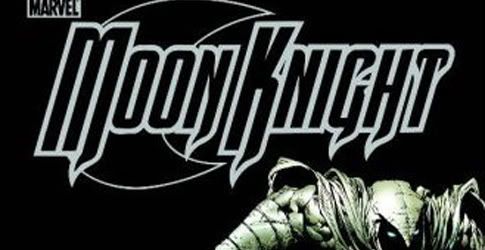
It's about time I put this post together, and I thought it would be important to start with the single most prominent thing about Moon Knight. Don't give him any shit, or he'll go ahead and cut your fucking face right off. I'm serious. If that isn't hardcore for a Marvel hero, I don't know what is.
In a panel that invoked everything hardcore that one could possibly bring to mind, Moon Knight does that deed to his arch-nemesis the Bushman, which was probably a good thing, because if I was going to commit to reading a book about a relatively lesser-known hero, I really don't want to hear about his unending battle with a fellow called Bushman. That shit would have gotten old really fast.
I'm getting a little ahead of myself, so I'll jump back to a more proper introduction. Moon Knight was relaunched just long enough ago for the first graphic novel collecting issues 1-6 to have recently made it to stores. I'd heard all about the critical reception of the new book and basically, it was praise all around. A ton has to go the artist, in this case David Finch (pretty sure), for bringing Moon Knight back with some serious style. In truth, he's not the toughest guy around, and I think even he'd admit it, but the way he looks in the relaunch you wouldn't be able to tell otherwise.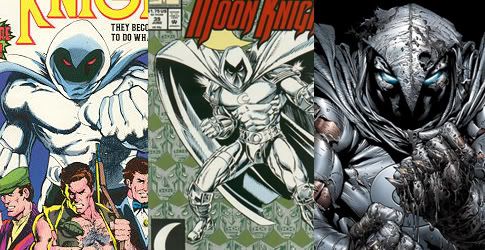
The evolution of Moon Knight from Casper the Ghost to Spawn in White.
The character is essentially Batman, in look and in spirit, as he's got no actual magnificent powers to work with. Add a dash of Spawn with the new gritty art style, cowl, cloak, and attitude; and top it off with some ancient Egyptian mythology, and that's Moon Knight in a nutshell. One of the coolest bits is where they explain why a character labeled Moon Knight, and obviously a patron of the nighttime hours, wears a shining white getup. Get this; it's because he's so hard that he wants them to see him coming, and be damned afraid he's there. Now doesn't Batman look a bit pansy from hiding in those shadows all the time?
The Egyptian mythology comes in to play through the backstory of Moon Knight and his relationship with the deity Khonshu. See, Moon Knight died, a few times actually, as both Moon Knight, and as Marc Spector before he took on the robes. He was returned to life by Khonshu, Egyptian god of the moon and vengeance, and his role is to be the avatar (living embodiment) of Khonshu. This seems like a cheeseball enough routine for a character, except Khonshu actually shows up to Moon Knight, talks with him, abandons him when he feels it's necessary, and expects him to deliver the requisite amount of vengeance necessary to satiate his thirst for bloodshed. This is where we start to see the layers of the character, as Spector doesn't necessarily want to go around cutting faces off, but without Khonshu he's, very literally, dead. Khonshu even appears to Moon Knight in the body of the Bushman, faceless and all, as a reminder of his greatest achievement towards vengeance. Dark, dark stuff.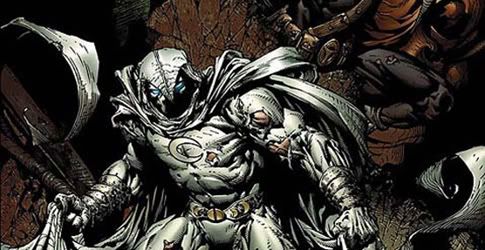
Check the battle with the most badass reworked Taskmaster ever for great, great action.
There are other layers to the character and the story as well, as Moon Knight has even suffered from multiple personality disorder in the past thanks to his various alter egos and identities, but this hasn't been brought up (yet) in the new story by Charlie Huston. The first book serves mostly as a reintroduction and rebirth of the character, an opportunity to meet some of the popular villains from Moon Knight's history, and a chance to see the very delicate relationship Moon Knight has with Khonshu.
I can't recommend the book enough, it's beautiful, well written, and hardcover (at least I think they're all hardcover), and it's running at about $6.50 used on Amazon. Pick up a copy in good condition and by all means give it a read. The series has moved on from this introductory story and I think even touched on some cool bits with Spider-Man, Captain America, The Punisher (where they both talk about being guys who just beat shit to death), and Civil War related issues. The second book hasn't been announced yet, but I'd probably expect it sometime this fall or winter.
BUY IT! BUY IT! BUY IT!
Labels: Books, Charlie Huston, comics, David Finch, Graphic Novels, marvel, Moon Knight
Just giving a shoutout to the single greatest advertising campaign I've seen put together on the Internet. The Philips Norelco Bodygroom has a genius team of people cranking this stuff out. Make sure to navigate all the menus, from the introduction, to the hilarious backstory of Frank Sack saving the beach. There's even a music video.
The best line from the entire thing comes in the 'Where to Shave' section:
"As soon as your partner sees your new [bleep] she may want to wear your [bleep] and [bleep] as a Roman gladiator mask while unveiling Christmas lights..."
Labels: Advertising, Bodygroom, Internet, Philips Norelco, Random
I've resorted to hyping my own blog posts ... someone, put me out of my misery. Instead of spewing forth a worthy collection of words, I'm going to offer a picture, and an excuse why those words aren't here. Here's the picture: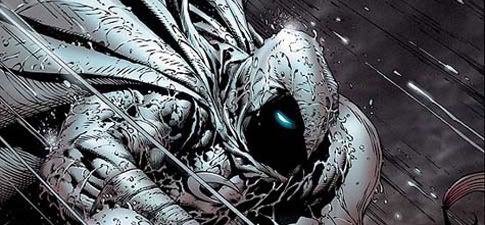
That's Moon Knight and he's going to be kicking your ass very soon. I've recently read his new book, and he's one of the greatest things the entire world of comic books has going for it right now. You'll be hearing about Moon Knight at length when, and here's the excuse, I'm not such a douche. Valid, no?
I've been busy with Modojo-work, preparing for school-work, and, well, work-work. Check the Portfolio link above for three previews I've tore out in the last week or so for Dungeon Maker (PSP), Touchmaster (DS), and Hoshigami Remix (DS). I promise I've got some stuff coming down the line that will make for interesting reading. Including, but not limited to, long thoughts about Power Stone and why it's so fantastic, my most recent conversation with XBLA, more on Moon Knight and other denizens of the Marvel Universe, and I'll be prepping a nice Zenspace History lesson for my 100th post (94th or so, right here).
Labels: Modojo, Moon Knight, Random, Updates
I've been putting this post off for awhile, but I think it's finally a proper time to say at least a few words about the anime that I've been keeping up with this Spring. I'm currently partaking in no less than 8 series, but not all of them are necessarily current, so I'll try to stick with the newly airing shows only. Even still, this Spring had more going on in anime than I normally allow myself to commit to.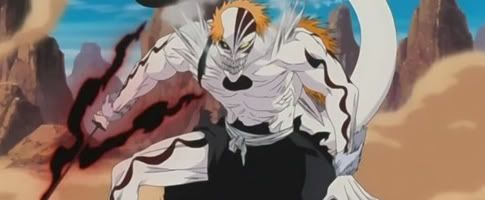
Bleach
Well, obviously there are going to be two series in this roundup that are ... well, givens. Bleach is like my long running lover, and although I left the skank while she flirted around with filler for 30 episodes, she came back, lost weight, and she's hotter than ever before. There's simply more going on in Bleach than the series had going for it even in the Soul Society arc. Add to that the increased powers that everyone is throwing around, and how can it not be awesome? The only lame thing I've noticed so far seems to be the subplot revolving around Orihime and her powers. Honestly, she's just not that interesting a character and her silly earrings are damned boring.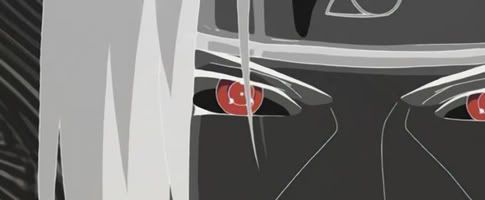
Naruto Shippuuden
I'm wondering if more people don't dislike Naruto now, than actually like it. I was never a bastion of the series, but just as with Bleach, I watched right up until the filler started. Now that things are back on track and time subsequently skipped, Naruto is definitely worth the attention. Characters are more powerful, less whiny, and the overall plot regarding the Akatsuki and the jinchuriki (those within whom the giant tailed beasts reside, i.e. Naruto & Gaara) is totally fascinating. I honestly can't wait to see all the tailed beasts revealed, because while Naruto the ninja fighting anime is mostly worthwhile, Naruto the giant monster/ninja fighting anime is freaking stellar.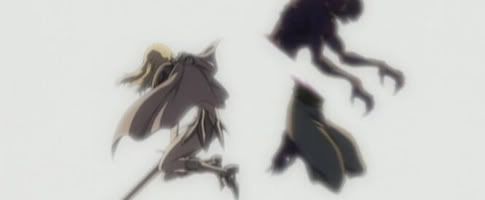
Claymore
I was always under the impression that Claymore was a manga series originating in Korea (manhwa then?), but that may not be true. Regardless, it's been out in manga form here in the States for awhile, and I always notice it on the shelves as something that seems interesting. True to form, an interesting manga has become an interesting show, and all is good in the world. Claymore has a strange Berserk-type feeling, although I'm not sure if it ever delves so deeply into bad-assery and the world of darkness. I can't quite put my finger on why I draw similarities between the two shows, it's just a gut reaction type thing. The main characters in this show are the Claymore, bad-ass ladies who've given up their lives to become half-Yoma (half-demon), in order to go ahead and kill the full-Yoma populace. This course leads them to a life of solitude and stoic murderous rampage. Which, to me, seems like a good life. Noting of course that the more they rely on their demon powers, the faster they become a demon themselves. Gratuitous slicing in half and innumerable decapitations included.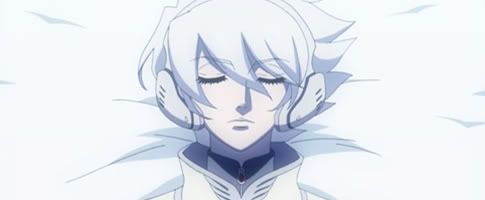
Toward the Terra
Hopping back to the classics is Toward the Terra, a series based off a manga that's ... damn old. I love it though, as they maintained some of that classic anime art-style that always catches my eye (Metropolis, Android Kikaider, Cyborg 009 as examples). I'm genuinely not sure where this series is going, as the last episode I watched could have changed the overall direction thanks to some new developments, but as it starts this is a great view of, don't shoot me for going back to it again, dystopian society. A world in which all seems cheery and joyful turns out to be one hell of a fascist regime responsible for administering "Adulthood Exams" for children at the age of 14. These serve the purpose of identifying whether or not the children have within them the genes that would qualify them as Mu (Rahxephon, anyone?). Mu are normal humans, to some extent, but born with psychic powers, and they're systematically terminated by the government. The series follows a boy born with seemingly limitless psychic potential, and his interaction with the ailing leader of the Mu (and general cool dude), Soldier Blue.
Tengen Toppa Gurren-Lagann
Oh man, how do I explain this? Gurren-Lagann is everything that should be in a series. First, it looks ridiculously good. I mean, best looking series I've seen in a long time here. It starts off with this insanely climactic battle in which .... well, the entire damned universe seems to be exploding. That's SO hardcore. Then it tones down to human society, forced to love hidden under the ground on a planet that is riddled by "beastmen" and their attacks on the surface. Humans have lived underground so long that most don't believe in the surface, and consider it a rumor or legend. That backdrop alone should be enough, but add to that a fantastic sense of humor and you've got the mixture for greatness. Not to mention Kazuma, the patron saint of reckless-type fighting characters, who is willing to face off against giant mechs with ... a sword. And it's not even like it's his sword, he took it from someone, he might not even know how to use it! The sword is important though; in one of the great early battles the scope of this blade is brought into question, as unsheathing it takes ... seriously, like 5 seconds. Think about that. Oh yeah, I didn't much mention the mecha and the great situations surrounding those, and ... most importantly, the Gainax Bounce is in strong, strong, strong effect here. Fanservice for the undeniable win. 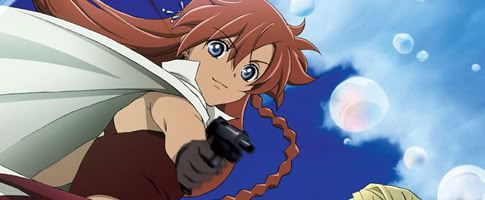
El Cazador de la Bruja
I'm falling behind in this, the latest series from those responsible for the other 'girls with guns' fare Noir and Madlax. It can only be expected though, as I've fallen behind in both Noir and Madlax as well. It's a ridiculous shame for me, because each one seems so damned good. El Cazador is no different, it just gets off to a slow start. There's mystery and supernatural elements and everything awkward that one could expect following Madlax, it just hasn't come in to play from what I've seen. Yet. The action, too, has been relatively low-key. I'm going to let this series simmer for a while longer before I jump back in. Hopefully, as the plot progresses the mysteries will either grow more mysterious (those are the best kind), or they'll reveal themselves (these kind, also are good).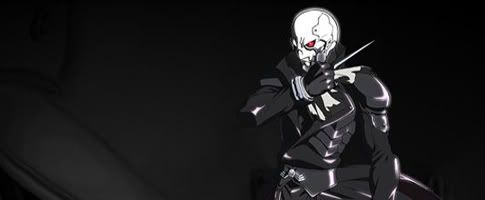
The Skullman
Honestly, I wish I could say more about The Skullman. The character seemed so damned interesting, but I haven't gotten past the first episode. The subbing groups were behind so I'd stopped checking, but I'm sure all is good and cheery in the world now, meaning I'll have to catch up. The Skullman is definitely a mystery (Just who is the Skullman?), but there are also some elements of mystery surrounding the main character, and his interactions with those around him. It's a weird little show that seems to be getting overshadowed by the big guys this spring (Gurren-Lagann), and I'll have to rectify that in depth in the future. The show has a weird style that reminds me of Lupin the Third or something of that sort, as the characters seem loosely drawn or lanky in some way. Until the action starts and The Skullman shows up, then everything gets nice and detailed as always.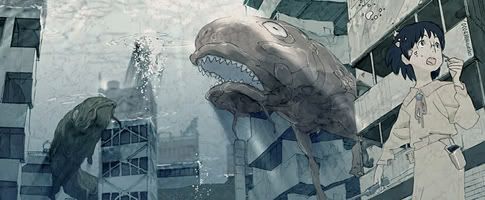
Denno Coil
The best for last? It could very well be that way. Denno Coil is a show that speaks to my passions. The storyline follows a world in which virtual reality isn't so much virtual, and our modern world has been overlaid with a digital one. This makes for all kinds of fascinating situations revolving technical issues like back doors, viruses, hacking and the like. This is blatantly reminiscent of what may be my favorite piece of animation ever, the segment Beyond from the Animatrix. Beyond is available on Youtube (Part 1 Here, and Part 2 Here), and I strongly suggest you watch it before undertaking Denno Coil, just for the ability to draw the reference. Even if you've seen it before, watch it again, as you probably forgot how good it is. Both Beyond and Denno Coil have that subdued look to them, Denno Coil much more so, and that is very visually appealing. The subdued look is far too underused in my opinion, and it alone is why I turn to things like Ichigo Mashimaro, Kino's Journey, and others.
That's it for new shows from me. Most importantly was getting the knowledge about these great shows to everyone else, but second to that, I need to know what I'm not watching that I should be from this Spring. Great stuff always slips under the radar, so if you know I should be partaking in a series that I'm not, let me know!
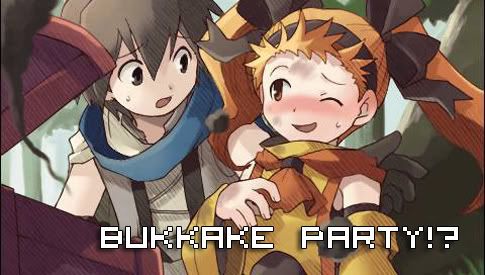
I'm all for mature games, but maybe Riviera's PSP rehash has gone too far. There is one precise location for bukkake parties ... and my PSP is not it. Get ready for the resurgence of "Porn on Your Child's Videogame System" on Channel 4 News.
All joking aside ... widget work is proceeding forward, although slowly. My movie links are back in action and stronger than ever before. It only took a Bonds-ian level of steroids to get them going too! More posts soon to come.
Labels: Bukkake Party, Picture Post, PSP, Random, Riviera, Riviera PSP, Sarcasm

Well, not really. I'm not changing the Zenspace all over again, I'm just going to forgo posting duties until I get my widgets back in action. See, when I changed this whole blog layout I knew that everything in my widgets (oodles of links) was going to be deleted. So, I took extra special care to copy the HTML for each widget to get all my links up and running again once I changed over to my snazzy new layout. Well, it turns out I might have forgotten to save the text file that held all those links ... yeah. I HATE losing links. I always feel like I'll never get them all back, and I've lost access to some corners of the internet forever. The last time Firefox accidentally wiped my bookmark list I thought briefly of suicide, then murder, then depression. Obviously, they weren't going to happen in that order. Anyways, I've got to begin searching for all the DVD studios, gaming sites, great clothery shops and other such cool things I once found. Wish me luck.
On a more random note, the picture above is concept art for the Lego Universe MMO. How interesting is that?
Labels: Lego Universe, Random, Under Construction
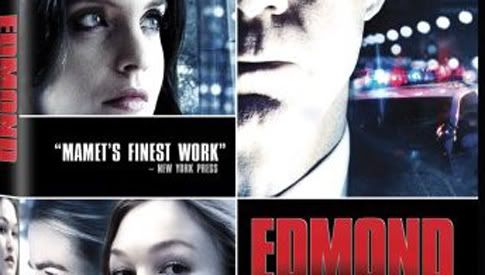
Written by David Mamet, Edmond first caught my eye when I noticed the lead role was played by William H. Macy. Macy is criminally under-used as a lead actor, and his parts in ensemble pictures are brilliant, so Edmond was something that piqued my interest. Being written by Mamet surely didn't hurt it's prospects either.
So, now that I've finally taken the time out to watch Edmond, I was left with some awkward impressions. Edmond starts out simply enough with William H. Macy's character Edmond indulging in some cryptic fortune telling, inspired by a slightly less cryptic but apparently significant noticing of numbers repeating in his life. Nothing akin to The Number 23 here, but Edmond pauses to notice the numbers, so the viewer obviously should too. After having his fortune told Edmond spirals out of control, leaving his wife, his sanity (maybe), and his former self behind. His night becomes a self-fulfilling prophecy as each event calls back the memory of the tarot card it so closely resembles. 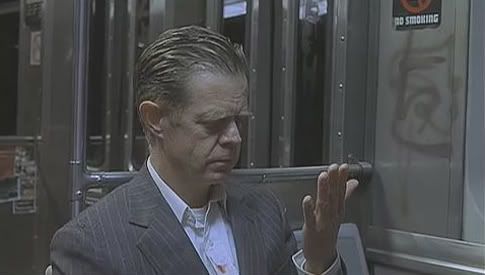
The night is filled with Edmond's search for sex and it's almost comical the difficulties he faces in a bureaucratic sex industry. His rage builds until a confrontation with a mugger frees him of much of his character's anxiety. Edmond, in better spirits, meets a waitress played by Julia Stiles and ends up shagging her silly. I'll accept that as a suspension of disbelief, but ...osh, Macy at 50 taking Stiles home for a night of passionate love-making ... hard to wrap one's head around. Regardless, the couple's tryst is all but stellar, as Edmond's descent into madness makes for some heated after intercourse conversation. Plot twists and turns follow, but I'll leave it for the viewer to discover.
The focus of the movie is centered upon Edmond's descent into madness, and how it supposedly is freedom from the bland, mundane existence we're all forced to face, but Edmond's quest lacks real definition. He seems as shattered by his actions as he is welcoming them, and he is ultimately apologetic, seeking only to return to the life he once had. Later, the new man he has become searches for epiphany in a jail cell, but his philosophical quests are childish and lack any of the real issues that come from the higher roads of the mind. Can we really believe that Edmond is some new man when he and his cellmate speak at length about whether animals are aliens, or some gods sent to watch us?
While Edmond and his descent into madness might not actually parallel any intelligent purpose other than a mid-life crisis, that's not to say the issues and the situations he faces aren't significantly more important. Edmond's rage is fueled by his distaste for the uncaring nature of our modern society, and in more than one scene this society is more than evident. Perhaps being the most powerful theme in the picture, it's believable and more than likely true that the people Edmond sees and their rude and unsavory actions are people we could see any day of the week.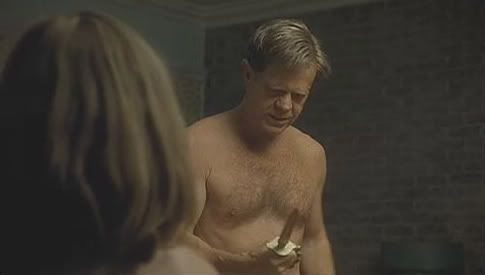
Mamet does wonders with the script though, and look for Macy spouting some of the best lines ever as Edmond. As he waves a WWI combat knife in his underwear and an obvious bout of madness he shouts, "I've got some warlike blood in my veins too..." in a very powerful diatribe. Watch Edmond for Macy's performance, a startling revelation on how rude society has become, and Mamet's script, but don't look to Edmond for any intellectual pursuit or lasting definition, it just isn't as deep or as life-changing as one could hope, and ultimately, that makes Edmond's character a bit of a joke. Also, note that there is an almost ensmeble cast of women in Edmond, with short scenes including Mena Suvari, Julia Stiles, and Denise Richards. Hotness is obviously present, if only for a short while.
The trailer is available here.
The DVD is now on sale at Amazon.
Labels: David Mamet, DVD, Edmond, Film, Movies, Reviews, Under the Radar Movies, William H. Macy
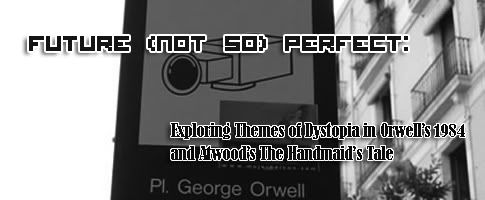
Future (Not So) Perfect: Exploring Themes of Dystopia in Orwell’s 1984 and Atwood’s The Handmaid’s Tale
The persistent appeal of dystopian literature has left a considerable mark on the course of much academic study. Novels such as 1984, The Handmaid’s Tale, Brave New World, and others remain constantly under the watchful eye of scholars and their students. Particularly, the nature of dystopian literature, which is to say, literature that shows the possible decline of societies not unlike our own, remains of interest because of the measure of similarities that can often be drawn to society as it now stands, and as it could possibly become. This proposes that much dystopian literature highlights current societal trends that tend to raise questions of the current course of economics, politics, or religious beliefs. Two dystopian texts in particular, George Orwell’s 1984 and Margaret Atwood’s The Handmaid’s Tale, deliver separate, but ultimately similar visions of the nature of possible dystopian states.
To consider a dystopian state, first clarifying the term itself is a necessity. The idea of dystopia is in short, the very opposite of utopia. Utopia, as defined in Thomas More’s text Utopia, is a small nation which seemingly lives in a perfectly ideal setting. A utopia, removed from the original literary source, has through time adopted the same notion. The term utopian is given to any civilization attempting, or currently undertaking in providing a society for its citizens that is better than the current conditions of other non-utopian states. The epistemological definition of utopia is “no place;” More could have been using the term itself to prove that the idea of perfection is not so easily attainable, although that has had little heed in altering the popular definition of utopia. To establish a utopia is to strive for perfection, and this is where More’s Utopia parallels the definition of the popular term utopia, despite the apparent failures the fictional society has been shown to succumb to. Just as dystopian literature is often based on the nature and course of the author’s contemporary society, More’s work is based in a time long past, and no longer proposes a place that the majority would proclaim to be ideal. Some would consider More’s Utopia to now constitute a dystopia, not only because of the vast difference in modern opinion from the time of More’s writing, but also is it not true to believe that attempting to create a utopia and failing is to potentially create a dystopia?
The natural opposite to utopia, dystopia is often described as an imaginary place in which people lead dehumanized and often fearful lives. (Merriam-Webster) Dystopias acknowledge the demise of individual differences as a way of keeping order in power and power in order. Dystopias are stories that contrast the failure of the main character with the unstoppable advance of society towards totalitarianism. The loss of the self is the character's final acknowledgement of, and ultimate contribution to, society's being definitively victorious. (Mihailescu) It is difficult to determine whether More has created a dystopia or a utopia, as our viewing of his text is now skewed by our own cultural opinions, but even then, the direction of most utopian/dystopian literature proves that “perfect” society is much closer to dehumanized and fearful society than one might think. For a utopia to become a dystopia is only through one small mistake or removal of freedom; it would be proper to suggest the two terms as opposite sides of the same coin, one flipping to the other with relative ease. The coin flips naturally to the dystopian side in the writing of 1984, which presents what might be the most potent dystopia of popular literature.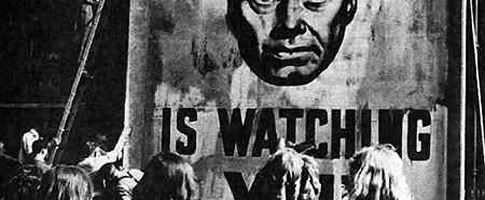
In writing 1984, George Orwell explores dystopia at its most hopeless and desperate vision. Winston Smith, living in Airstrip One, subjugated to a life that is in almost all possible forms, fearful and dehumanized. The laws and practices of Oceania, mother nation to Airstrip One and ultimately Winston Smith, portray a number of the characteristics (“International Reading Association”) that signify a society as particularly dystopian. Oceania is consistently under the influence of propaganda from numerous sources. Media, other society members, and most obviously the telescreens provide a ceaseless flow of misinformation for Oceania’s citizens. Individuality in any manner and even free thought are condemned to those living in Oceania. The society worships Big Brother, a figurehead that provides an emotional focus, and potentially doesn’t even exist. Those living in Oceania are thought to be under constant surveillance from the telescreens, microphones, and once again, even from other society members. The social structure in 1984 is also frozen, so as to allow as little movement as necessary. Each important aspect of Oceania’s civilization is built around maintaining a situation in which the populace is meant to partake in an obviously dehumanized and fearful existence.
Where 1984 depicts a society in which the whole of the populace is under the grip of a totalitarian state, within Atwood’s The Handmaid’s Tale, another possible dystopia is shown, and this one, while dehumanizing and potentially dangerous to all members, is a much more significant threat to the liberty of women. The Republic of Gilead, the governing party in The Handmaid’s Tale, follows many of the same tenants of what could be characteristically dystopian, but it also explores other outlets that Oceania doesn’t, just as Oceania explores some that The Republic of Gilead neglects. The Republic of Gilead is modeled after a religious precedent, particularly The Christian Bible, a text that many in contemporary American society proclaim highlights what could potentially create a perfect society. This questionable source material for creating an ideal state allows those in power to propose a society that is actually an illusion of perfection, particularly an illusion in which men are superior to women. Men have (power over) "the word", women do not; "the word" is singular, monolithic, and biblical because it originated by God, the father. (Cavalcanti) Those living in Gilead are expected to conform to the standards set for their particular caste, whether they are Wives, Econowives, Handmaids, or Marthas. Citizens are also under the impression that they are consistently under surveillance by the Eyes. Naturally, this all makes for a society that is potentially as dehumanizing as the society in 1984, or any other similar oppressive state.
While these are both but small descriptions of the particular aspects that emphasize what makes each of these societies particularly dystopian, they obviously share between the two, a number of obvious similarities. Both societies focus on maintaining an apparent constant surveillance on their members, or at least imposing the thought upon their citizens that they could possibly be under surveillance. Also, the removal of freedoms is a necessary aspect to both dystopian states, and the members are restricted from possessing certain materials that can help propose individuality, freedom, or the knowledge of other or past societies. These similarities constitute what could possibly be the more weighted aspects necessary to create a dystopian state, at least in these two particular societies. To suggest that each author chose these among all possible outcomes as coincidence is to propose that these similarities weigh the same as other, less important aspects of each society. The notion of dehumanization, limited freedom, and constant surveillance are present in each text because these concepts maintained to be a fearful aspect of society not only during the writing of 1984 in 1948, but they also proved to be significant until the writing of The Handmaid’s Tale in 1985. The nature of dystopian, and even utopian, literature is undeniably shaped around society during the time of any text’s creation, and this fact, proves that while a particular setting, or other elements of a dystopian text may change, the reoccurring elements are the most important in defining society as it currently stands, and the possible fears that arise from the course and direction it is taking.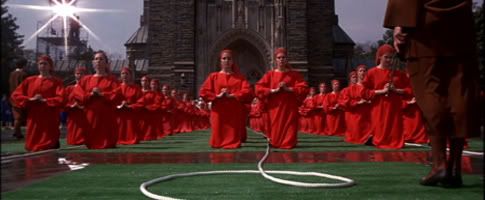
That is not to proclaim that the differences between the two texts aren’t equally valid in determining the fears and status of society at the time of a texts creation. The feministic view of Atwood’s The Handmaids Tale provides a very effective inspection of society at the particular time in which she was writing. Atwood explains herself, “The majority of dystopias - Orwell's included - have been written by men, and the point of view has been male. When women have appeared in them, they have been either sexless automatons or rebels who have defied the sex rules of the regime. They have acted as the temptresses of the male protagonists, however welcome this temptation may be to the men themselves.” (Atwood) However, this particular viewpoint of a feminist dystopia can only show the topic as it is understood within society at the time of her writing, not how important the issue has maintained to be, by consistently proving a factor in dystopian states through changes in time and society. The Handmaid’s Tale provides an excellent example of how relevant this is towards a temporary setting in the novel coming to no particular conclusion in the story of Offred. This irresolution reflects the position of mid-1980s feminism. In articulating the potential danger of certain directions in which the movement had been heading, the novel can only advise its readers to err on the side of caution, and defend liberty before ideology. (Tolan)
Some of the aspects of 1984 that aren’t shared in The Handmaid’s Tale are just as rooted in the post-WWII era in which Orwell was writing. The widespread fear of fascism and totalitarianism in this era is particularly responsible for the structure of the Party, and the realistic parallels to the failed communism in The Soviet Union between characters like Big Brother and Goldstein, and their possible counterparts in Stalin and Trotsky originate directly from Orwell’s own belief in socialism. Each of these aspects are integral towards the composition of a dystopian state in 1984 and The Handmaid’s Tale, but the rooted nature of these differences to their particular time periods could propose that these elements are secondary in nature, while the primary elements are those that tend to be more pervasive through all dystopian literature, and reoccur more commonly throughout the texts.
Identifying the nature of dystopia through the particular elements that most often repeat in literature allows for not only an academic analysis of each text, but also provides the opportunity to discern what core dystopian fundamentals are still being instilled through our society, and even through our own limited viewpoints. The nature of dystopia is to be dehumanizing and fearful, but the study of dystopia can provide answers to where fear and dehumanization truthfully originates. Orwell’s 1984 and Atwood’s The Handmaid’s Tale explore two dystopian societies, separated by nearly half a century in societal change, and yet each novel focuses on similar aspects of dystopia that have carried through those time periods in either society, or in the very core values of ourselves. For these fundamentals of dystopia to remain fearful allows us to, in some respect, define ourselves by them, while the differentiating aspects of each text can show society as it existed, or currently exists, only in discovering the pattern of how we view dystopia, can society attempt to view and shape where it will ultimately choose to travel.
Works Cited
"Definition of dystopia from the Merriam-Webster Online Dictionary."
Merriam-Webster. 2006. 1 Mar 2007
http://www.m-w.com/cgi-bin/dictionary?book=Dictionary&va=dystopia.
Mihailescu, Calin Andrei. "Mind the Gap: Dystopia As Fiction."
Style 25. 21991 1 Mar 2007
http://web.ebscohost.com/ehost/detail?vid=1&hid=122&sid=...
cace465a-734e-42a3-ba33-ec3ce866ea03%40sessionmgr102.
"Dystopias: Definition and Characteristics." International Reading Association. 2006.
International Reading Association. 1 Mar 2007
http://www.readwritethink.org/lesson_images/lesson926/DefinitionCharacteristics.pdf.
Cavalcanti, Ildney. "Utopias of/f Language in Contemporary Feminist Literary Dystopias." Utopian Studies 11. 22000 1 Mar 2007
http://web.ebscohost.com/ehost/detail?vid=1&hid=101&sid=...
a781beb2-fbb7-496e-94be-c227dbc06d4c%40sessionmgr108#AN0004215697-9.
Atwood, Margaret. "Orwell and me." Guardian Unlimited. 2006.
Guardian News and Media Limited. 1 Mar 2007
http://books.guardian.co.uk/print/0,,4691839-99930,00.html.
Tolan, Fiona. "Feminist Utopias and Questions of Liberty." Women: A Cultural Review
16. 12005 31. 1 Mar 2007
http://web.ebscohost.com/ehost/pdf?vid=2&hid=122&sid=4b25353f...
-9d09-4ec7-825a-21a532a10f17%40sessionmgr103>.
Note: This paper has been copied from it's original format, therefore certain italic, bold, and other pre-formatted styles may not be included. Links may, or may not work as copied, please contact me for more detailed source information.
There are no longer hidden gestures. No longer hushed whispers and offhand remarks. The line has been drawn. The gauntlet ... thrown. 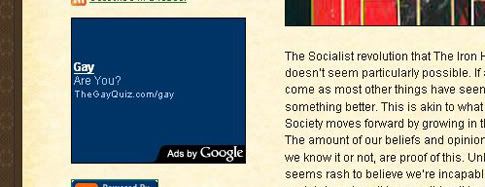
Google ... is trying to love me. The dirty way. I can't even properly tag this post, as I fear I'll just be propagating this mess even further. It must end.
Note: The Beginning of His Blatant Desire
Labels: Google, Picturee Post, Random



